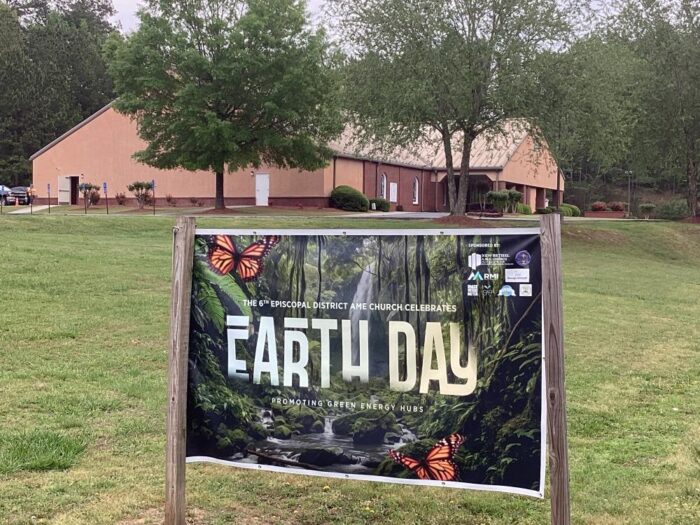AME church network launches microgrid program in Georgia

Microgrids are going to church in Georgia. The African Methodist Episcopal (AME) Church Sixth District has developed a pioneering renewable energy program to create microgrids at churches across the state. The initiative is starting with a goal of installing five systems by 2026.
Comprising all the AME churches in the state of Georgia — 482 church locations that could eventually deploy microgrids to boost community resilience and energy independence — the Sixth District’s initiative marks a significant step in the AME Church’s ongoing commitment to environmental stewardship.
Since 2023, the Sixth District has been developing this innovative program, which includes the installation of solar panels, electric vehicle charging stations, battery storage systems, and implementing energy efficiency measures. The program also introduces bidirectional charging technology, allowing church facilities to serve as energy hubs and resiliency centers for their communities, where community members can charge medical equipment, store medicines and seek shelter in an emergency.
With a typical solar energy system projected to generate an average of 70 MWh annually per church, each system is expected to offset roughly 93.5% of the church’s annual energy usage, paying for itself after only eight years. Systems are usually operational for over 25 years. Collectively, the Sixth District’s 482 church sites represent approximately 34 GWh of potential annual production capacity.
“This initiative is a testament to our dedication to caring for God’s creation and serving our communities,” said Bishop Michael Leon Mitchell, Presiding Prelate of the AME Church Sixth District. “Microgrids provide an opportunity to solve so many problems all at once, including strengthening our communities to better face adversity, saving money on utility bills, and reducing pollution. By embracing clean energy technologies, we’re reducing our environmental impact and bringing cutting-edge solutions to African American communities through the church.”
The program builds upon the AME Church’s Climate Change Resolution, which committed the denomination to climate action and supporting policies that create healthy communities and a clean energy future. This resolution passed at the 50th General Conference in Philadelphia, outlined the biblical basis for addressing climate change and encouraged churches to take practical steps toward sustainability.
Georgia is particularly susceptible to utility outages associated with extreme weather events, including Hurricane Helene which in September 2024 knocked out power for over 1.3 million residents statewide. Some AME Church congregants were without electricity for over 3 weeks. Georgians’ electricity bills are also higher than the national average, with more rate increases expected.
Bishop Reginald T. Jackson, Chair of the Social Action Commission, emphasized the importance of this program: “Our resolution was just the beginning. Today’s announcement demonstrates our continued commitment to putting our Faith into action. By creating these microgrids, we’re reducing our carbon footprint and increasing resilience and energy independence in our communities.”
To date, with the help of faith-based environmental nonprofit Georgia Interfaith Power & Light (GIPL), the Sixth District has completed feasibility studies for 13 churches and aims to have a total of 70 studies finished by the end of the year. This ambitious goal underscores the Church’s dedication to rapid and meaningful action on climate change. By 2026, the Church aims to install five systems at Sixth District churches, with the ultimate goal of creating microgrids at as many of its 482 church locations as possible.
“The AME Church’s microgrid program is a shining example of faith-based climate leadership,” said Codi Norred, executive director of GIPL. “By combining practical solutions with community engagement, they’re creating a model to inspire and guide other faith communities’ sustainability efforts.”
Pastor Thurmond Tillman of the First African Baptist Church in Savannah, one of the pilot churches for this initiative, expressed his enthusiasm: “As a community rooted in Faith and history, we recognize that caring for our environment is an extension of our spiritual duty. This clean energy program empowers us to be better stewards of creation and enhances our ability to serve those in need within our community.”

Reverend William E. Thomas Jr. of New Bethel AME Church added: “Faith and action are inseparable. By embracing clean energy, we’re securing a sustainable future for our communities and stepping up to take care of God’s creation. This program reflects our deep commitment to stewardship, resilience, and progress in facing challenges.”
To support implementation of this ambitious clean energy vision, the AME Church Sixth District will partner with Capital Good Fund, a nonprofit Community Development Financial Institution (CDFI) and a federal grantee under the Environmental Protection Agency’s Solar for All program. Solar for All is a nationwide initiative to bring the benefits of solar energy to low-income and disadvantaged communities that have previously had less access to solar.
“Churches are critical partners in the clean energy transition,” said Alicia Brown, director of the Georgia Solar for All program. “When the community has a need or a disaster strikes, they are often the first organizations to step up and offer help. We’re proud to partner with the AME Church on this bold initiative to build resilience hubs, train the next generation of solar workers, and deliver meaningful savings to churches and the households they serve.”
The clean energy program complements the AME Church’s existing environmental initiatives, encouraging members to plant trees, create community gardens, purchase climate-friendly appliances, recycle, compost, and choose eco-friendly event options. As the AME Church Sixth District embarks on this groundbreaking journey, it continues to fulfill its mission of ministering to all people’s social, spiritual, and physical development while taking bold steps to address the urgent challenge of climate change.
“Historically, the Black Church has served as a pillar of hope, inspiration, and progress within Southern communities,” said Fenika Miller, Economic Recovery Corps Fellow. “This microgrid initiative empowers Southern Black congregations to carry forward that legacy of leadership and invites new faith leaders to reimagine how houses of worship can be leveraged to build more environmentally and economically sustainable and thriving communities.”
Nationwide, microgrids are playing an increasingly important role in providing resilience and energy independence in underserved areas without contributing pollution to already overburdened populations and environmental justice communities. In 2022, the country’s first neighborhood microgrid came online in Chicago’s historic Black community of Bronzeville. In 2023, Progress Village became Florida’s first Black community to build a community microgrid.
“This microgrid initiative is truly groundbreaking,” said Melinee Calhoun, senior state organizing manager, Black Voters Matter Fund. “It’s a powerful example of what collective power-building in action looks like. We’re proud to stand with our AME faith leaders as they work to address energy burdens, resilience, and other climate-related challenges impacting Black communities.”




